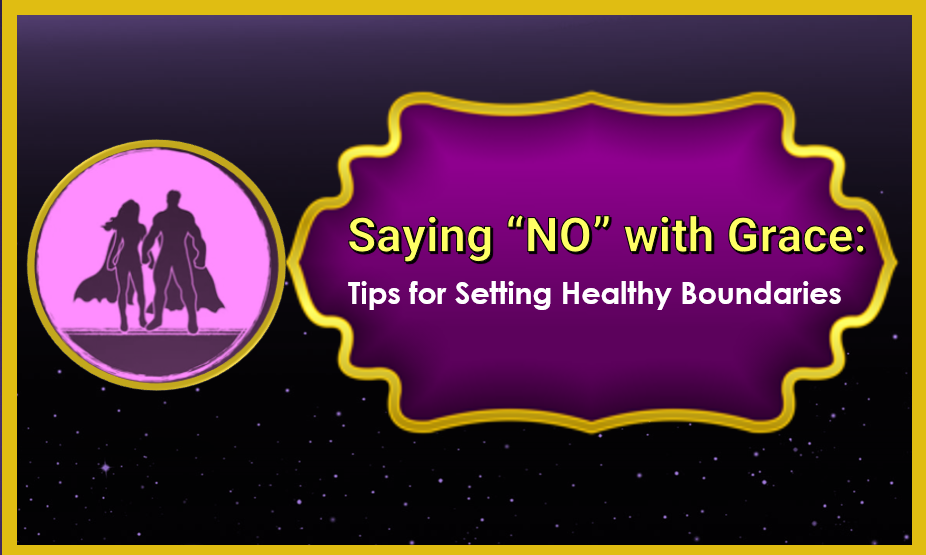
Have you ever felt you were being taken advantage of? I bet; your answer is “yes”! It never feels good when someone takes advantage of you. It can make you feel poorly about yourself and take a negative toll on your relationships. It can also make it harder to trust other people in the future.
Signs of being taken advantage of:
- The person is only affectionate or intimate with you when it is convenient for him/her
- The person expects you to take care of his/her needs
- The person asks you for money, favors, or other items
- The person appears disinterested in you after his/her needs have been met
- The person does not make an effort to be there for you when you need him/her
- Your sacrifices do not count
- You are ignored
- You are not their priority
- You are often blamed
- You know you deserve to be treated better
- You feel unappreciated
Now you know that it is happening around you. So, what comes next? Answer is, setting the healthy boundaries!
What are boundaries?
Boundaries are basic respectful guidelines created that establish how others behave around you. It let others know what is and what is not okay/acceptable. It honors your needs and wants so that you feel respected and safe. It limits the likelihood of people manipulating or taking advantage of you.
Setting boundaries can be challenging. But it is an essential part of self-respect. In our fast-paced life, it is easy to feel overwhelmed. We often say “yes” to everything, fearing that by setting boundaries will disappoint others. However, the truth is that establishing healthy boundaries is essential for our mental, emotional, and physical well-being. By recognizing and implementing healthy boundaries, we can reclaim our time, energy, and personal space.
Benefits of Setting Boundaries:
- Self-Care and Well-being: Establishing boundaries allows us to prioritize self-care and protect our physical, emotional, and mental well-being. It ensures that we have time and energy for activities that nourish us and helps prevent burnout.
- Healthy Relationships: Boundaries promote healthier relationships by establishing clear expectations and fostering respect. They enable effective communication, build trust, and create a sense of emotional safety and mutual understanding.
- Increased Productivity and Focus: By setting boundaries around our time and commitments, we can prioritize tasks, avoid distractions, and improve our productivity. Boundaries help us focus on what truly matters and prevent us from becoming overwhelmed or spread too thin.
- Improved Emotional Health: Boundaries protect us from emotional manipulation, toxic relationships, and excessive demands. They enable us to regulate our emotions, maintain healthy boundaries within ourselves, and foster a greater sense of emotional well-being.
- Personal Growth and Empowerment: Setting boundaries is an act of self-assertion and self-empowerment. It helps us clarify our values, assert our needs, and cultivate a stronger sense of self. By setting and enforcing boundaries, we can experience personal growth and develop a stronger sense of self-worth.
How to Establish Healthy Boundaries? Setting healthy boundaries requires self-awareness. We need to be clear about our expectations of ourselves and others. We should know what we are and are not comfortable with. Setting healthy boundaries requires good communication skills that convey clarity.
- Self-Reflection: Begin by identifying your values, needs, and limits. Reflect on what is essential to you and how you want to allocate your time, energy, and resources.
- Communicate Clearly: Articulate your boundaries confidently and assertively. Be direct, honest, and respectful in expressing your needs and expectations.
- Learn to Say No: “No” is a complete sentence. You can say no without an explanation. Saying “no” is not selfish. It is an act of self-care and self-preservation. Practice setting boundaries by politely declining requests or obligations that do not align with your priorities or values.
- Trust Your Intuition: Listen to your instincts and honor your feelings. If something does not feel right or comfortable, it is a sign that a boundary may need to be set or adjusted.
- Seek Support: Share your boundary-setting journey with trusted friends, family, or a therapist. Surround yourself with individuals who respect your boundaries and can provide guidance and encouragement.
- Boundaries should be flexible. Do not draw your boundaries in permanent ink. When boundaries are too rigid or inflexible, problems can occur. You do not need to have the same boundaries or comfort level for everyone.
Maintaining Healthy Boundaries:
- Regular Self-Assessment: Check in with yourself periodically to evaluate whether your boundaries are being respected and if any adjustments are needed.
- Self-Care Practices: Engage in activities that nourish your mind, body, and soul. Prioritize self-care to recharge and maintain your well-being.
- Flexibility and Adaptability: Be open to adjusting boundaries when circumstances change or when new situations arise.
- Practice Self-Compassion: It is natural to make mistakes or encounter challenges when establishing boundaries. Be gentle with yourself, celebrate your progress, and learn from any setbacks.
Boundaries can be physical, emotional, or intellectual, and they can vary depending on the context.
Some examples of setting personal boundaries:
- I will not tolerate being used
- I will not tolerate being taken for granted
- I will not put up with abusive behavior from anyone
- I will not let anyone else control my emotions
- I will not allow people disrespect me
- I will not spend time with people who do not respect me
- I will not do anything that makes me feel uncomfortable
- I will not let anyone else determine my happiness
- I will try to control my negative thoughts
- I will not ignore my own needs in order to satisfy someone else’s demands
- I will not let anyone make decisions for me
Some examples of setting boundaries with family:
- Put your needs first
- It is ok to ask for time alone
- Let them know that you cannot always be available to answer calls or texts immediately
- Set the boundaries around certain topics of conversation, or establishing expectations around household chores
- Prioritize your time. Set the boundaries about your need for privacy in your own room
- Take the time to be clear about what you are willing to tolerate and not tolerate from them
- Say no to spending time with family members who make you uncomfortable
- Ask to finish speaking without being interrupted
- Avoid gossiping with family members as almost always it leads to conflict
- Establish distance from toxic family members or to seek support from a therapist or counselor
- Learn to walk away when the family member’s behavior makes you angry enough to lose your temper
Some examples of setting boundaries in friendships:
- Phone and texting boundaries including when and how often you communicate
- Openly express your thoughts and feelings, even when you disagree
- Address conflicts and problems in the relationship openly and respectfully
- Find compromises to meet both people’s needs and preferences
- Make decisions on your own without the other person’s approval
- Maintain your individuality
- Check your schedule and to-do list before agreeing to plans with friends
- Do not commit to helping a friend unless you are sure you can
- Apologize for not being able to help and explain why
- Listen to their side of the story with an open mind
- Do not bring up the past, other issues, and do not involve other people
- Treat your friends the way you want them to treat you
- You can set boundaries around certain topics of conversation, or asking for privacy
Some examples of setting boundaries at the workplace:
- Set and stick to your working hours, even if you are working from home
- Decline meetings where your presence does not add value
- Turn off social media and notifications while you are doing important work
- Use your vacation time to enjoy fully. Let your coworkers know that you will not be available for work-related calls or emails
- Turn off your webcam during Zoom meetings when you need to
- Set and take a lunch break
- Take sick days when you need them
- Communicate your boss how you like to receive feedback
- Use an automatic reply saying you are unavailable after certain hours
- Let your colleagues know in advance when you’ll be out of the office
- Clarify with your boss that you are a caregiver and may need to respond to emergencies at home
- Keep your weekends free of work-related social gatherings
- Be clear with your family about when you are busy working
Is there any harm in setting up the boundaries? Do people get hurt by it?
- Initial Discomfort or Pushback: When we start setting boundaries, it can initially feel uncomfortable or be met with resistance from others. People may not be accustomed to our new limits, and this can create tension or conflicts in relationships. This discomfort is often temporary and can be overcome with clear communication and consistency.
- Fear of Rejection or Disapproval: We may fear that setting boundaries will lead to rejection, disapproval, or conflict. This fear can make it challenging to assert our needs and establish boundaries. Remember that setting boundaries is crucial for our well-being, and maintaining healthy relationships.
- Guilt or Self-Doubt: We may experience guilt or self-doubt when saying “no” or prioritizing our needs. Society often encourages selflessness and people-pleasing, which can make it difficult to prioritize ourselves. Setting boundaries is an act of self-care.
- Navigating Balancing Act: Striking a balance between maintaining boundaries and being flexible can be a challenge. It requires ongoing self-reflection, self-awareness, and adaptability. Sometimes, we may need to reassess and adjust our boundaries based on changing circumstances or relationships.
While there may be challenges or discomfort associated with setting boundaries, the benefits far outweigh the potential harms. It is an essential practice for creating a balanced and fulfilling life!

Nice article. Everyone faces this
Yes, specially our generation. Thank you.
Great writing…
Thank you.